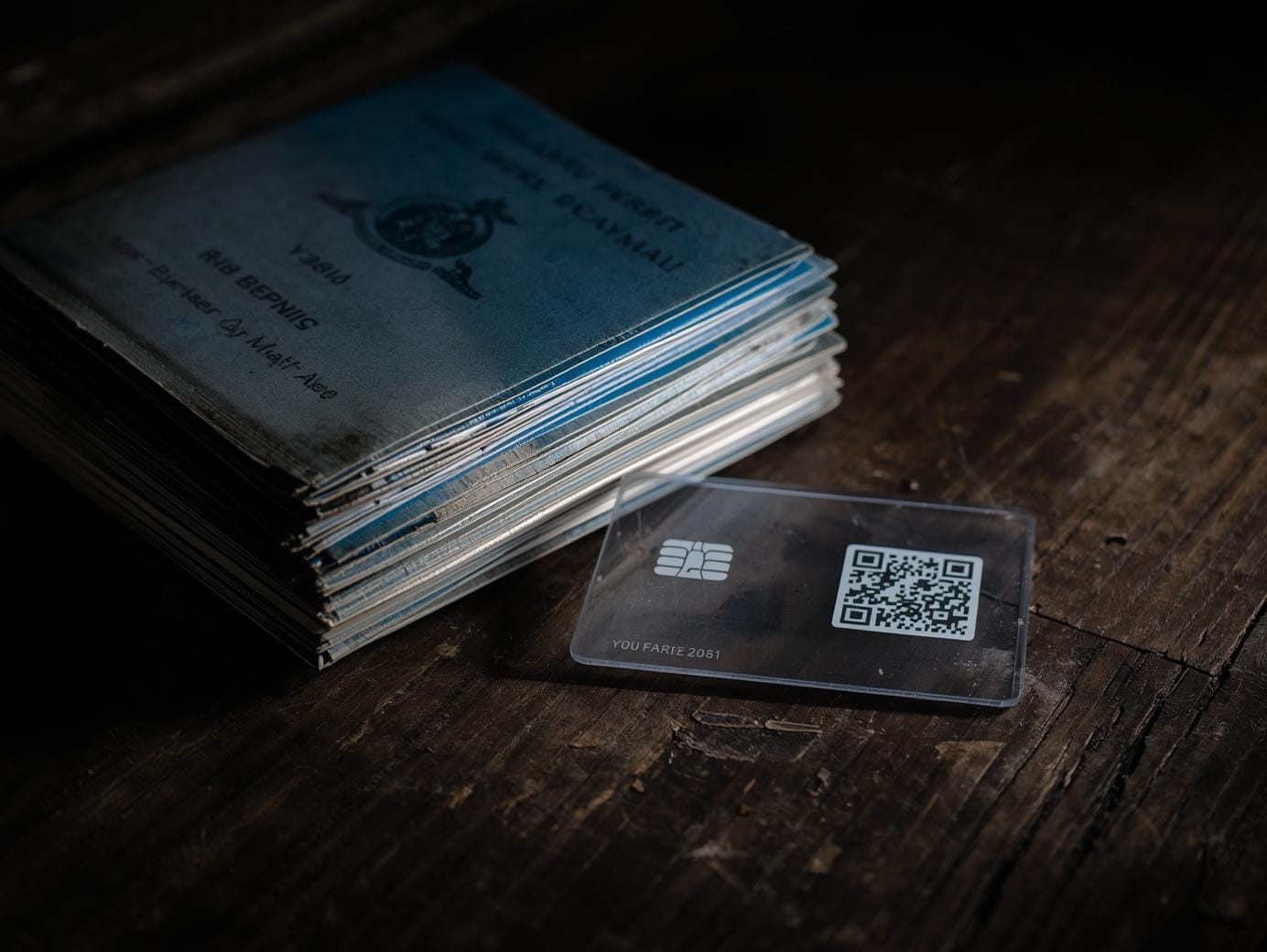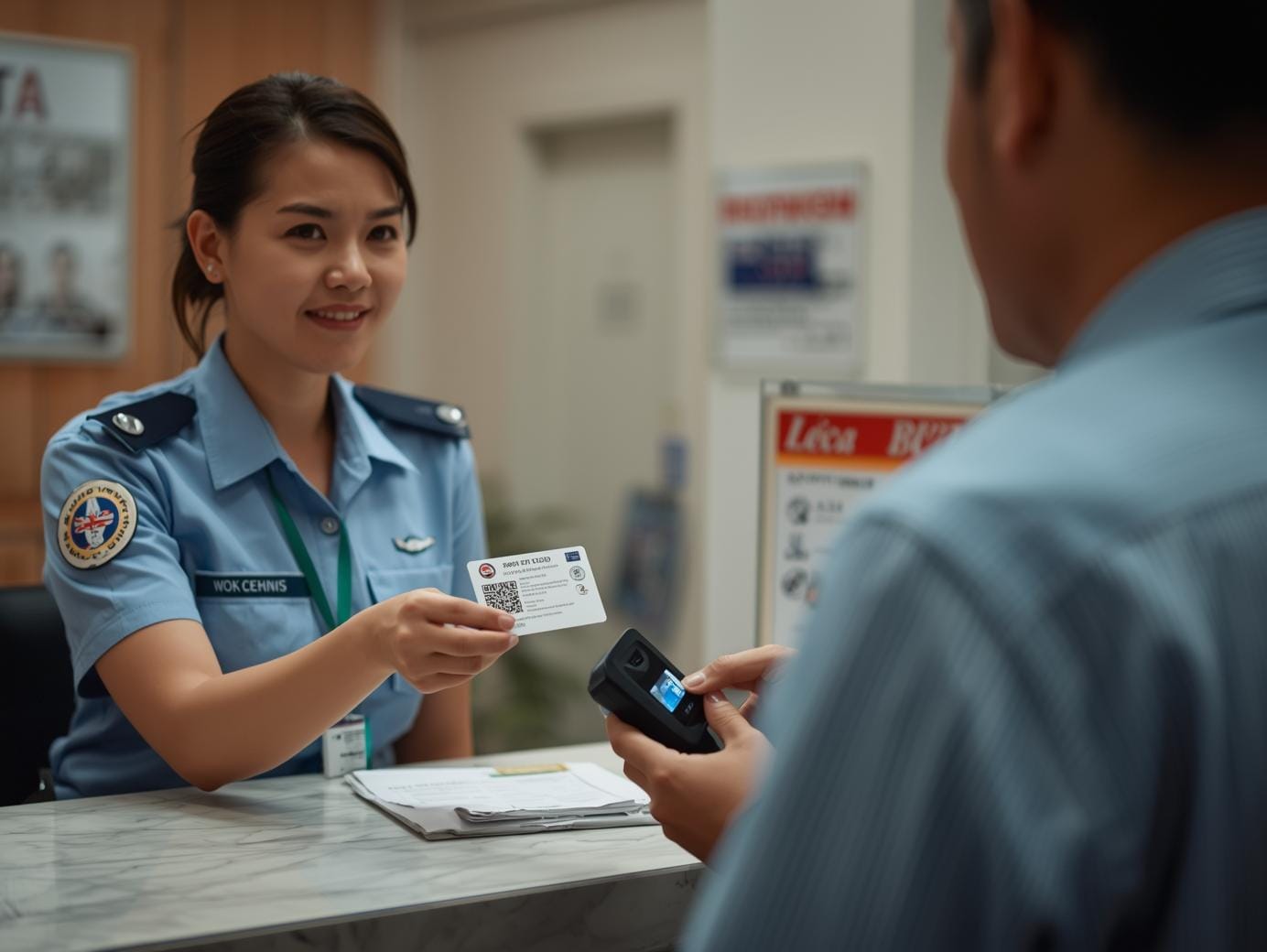For decades, foreign professionals in Thailand carried a little navy-blue work permit book as a rite of passage through bureaucracy. In 2025, that paper relic is finally going digital. Thailand’s new e-Work Permit system promises faster online applications, a high-tech biometric ID card, and far fewer 7:00 AM office queues for expats and their employers. Here’s what’s changing, why it matters, and how this modern work permit actually works in practice.
By Nicha Vora
Out with the Blue Book: Thailand’s Leap to Digital Work Permits
You shuffle into the Labor Ministry at dawn, clutching a folder of documents and that familiar blue Work Permit booklet. It’s a scene every expat in Thailand knows well – or knew well. That ritual is about to become history. This year, Thailand is rolling out a new e-Work Permit system that replaces the old-school paper work permit with a sleek digital process. The iconic blue book, once filled with yearly stamps and scribbles, is being swapped for a secure, credit-card-sized permit embedded with barcodes and QR codes. In other words, getting permission to work in Thailand is finally entering the 21st century.
“It’s the biggest shake-up to Thai work permits in decades, swapping ink stamps for QR codes in the name of convenience.”
For foreign professionals, this digital shift isn’t just a minor tech upgrade – it feels like a weight off their shoulders. The Ministry of Labor’s modernization drive means the old paperwork dance is giving way to an online platform and a smartphone-friendly permit. Thailand is embracing a more expat-friendly approach to managing foreign talent, and the message is clear: the bureaucratic labyrinth is (slowly) untangling. The next sections will break down exactly how the new system works, what gets easier, and what stays the same in this quiet revolution.

Applying Anywhere, Anytime: How the E-Work Permit Process Works
Imagine you’re a software engineer about to be hired in Bangkok. Instead of waiting until you’re in Thailand and shuffling through a government office, you (or your HR department) can start the work permit application from anywhere in the world. The Ministry of Labor’s new e-Work Permit web portal (ewp.doe.go.th) lets you log in, fill out the application form online, and upload all the required documents digitally. That means your passport scans, degree certificates, employment contract – all of it can be submitted with a few clicks, no photocopies or in-person submissions needed.
From there, you’ll schedule an appointment at one of over 40 Foreign Work Permit Service Centers nationwide. This appointment is the only time you’ll need to show up in person under the new system. When your appointment day comes, you’ll visit the center of your choice (be it Bangkok, Chiang Mai, or one of the hubs across Thailand) to do a quick biometric scan – fingerprints, maybe an iris scan – and then receive your shiny new work permit card on the spot. The entire in-person process takes around 12 minutes now, not the half-day slog it used to be. In fact, at some centers the “apply online, one-stop visit” model is so efficient that expats are walking out with their work permit card in hand before their coffee cools.
“One quick biometric appointment now replaces what used to be weeks of back-and-forth paperwork.”
Throughout this process, the system keeps you in the loop. You can track your application status in real time online, and the portal will ping you with notifications if any document is missing or if an additional step is needed. Even the government fees can be paid electronically, saving you yet another trip to a counter. In short, from initial submission to final pickup, Thailand has cut the red tape down to a single, predictable timeline. For the first time, you could be approved to work in Thailand before you even board a plane, with only a brief stop at a service center after you arrive to finalize the biometrics and card issuance.

Faster, Simpler, More Secure: Why Expats Gain from E-Permits
The benefits of Thailand’s digital work permit rollout are immediate and tangible. First, it slashes the paperwork burden. No more multiple copies of every form or digging up ancient company letters for each renewal – once you’ve uploaded your documents to the portal, they’re in the system. The days of couriering forms or making frantic last-minute photocopies are fading fast. For expats far from Bangkok or those busy launching a new project, being able to do everything online is a game-changer; it levels the playing field whether you’re working in a Bangkok high-rise or on a beach in Phuket.
Speed is another huge win. Processing times are expected to shrink because officials aren’t shuffling papers between desks – everything is digitized and can be reviewed more quickly. In Bangkok, a standard work permit used to take about 7–10 business days (and much longer in upcountry provinces). With the new e-permit, those timelines could improve, especially as the system matures. One reason is fewer delays: the platform’s real-time feedback helps you fix any errors in your application immediately, rather than discovering them weeks later. And when approval comes, you no longer need to personally pick up the permit if you’re tied up – under the new rules, your work permit can even be delivered by mail or collected by an authorized representative, sparing you an extra trip to the Labor Office.
Security and compliance are better by design. The new credit-card style permit isn’t just prettier – its QR codes and barcodes make it easy for authorities to verify your work status on the spot, reducing the chance of forgery or “misplaced” permits. Losing that flimsy blue book (or accidentally putting it through the laundry) used to be a nightmare. The new card is more durable, and even if you misplace it, your records are stored safely in the digital system. Plus, because the e-Work Permit platform ties into other databases, it helps ensure only legitimate, approved workers are holding those cards. In practical terms, that means more peace of mind for you and your employer.
For tech-savvy expats, there’s even an app for that. Thailand’s Ministry of Labor has a “Digital Work Permit” mobile app (initially built for certain Board of Investment-sponsored employees) that lets you display your work permit details on your phone instead of carrying the physical card or book. As the new e-Work Permit system expands, expect digital wallets like these to become a standard part of expat life – making it as easy as pulling up a boarding pass on your phone. All these improvements boil down to one thing: less time spent on paperwork and office visits, and more time focused on your actual job (or enjoying your life in Thailand).
“For the first time, you can secure a Thai work permit from your living room – and spend your saved hours enjoying Thailand instead of standing in line.”
On a broader level, these changes also make Thailand more attractive to global talent. Businesses can onboard foreign hires faster and with less hassle, which means your new boss is likely just as happy about the e-permit as you are. From tourism and hospitality to tech startups, industries across Thailand are set to benefit from a more streamlined work permit system that gets skilled people in the door and on the job with minimal delay. It’s a rare win-win for both expats and the economy.

New System, Same Rules: What You Still Need to Get Right
Amid the optimism, a word of caution: digital convenience doesn’t override Thailand’s underlying work permit rules. All the core requirements that existed in the old “blue book” era still apply. You must have the right visa (typically a Non-Immigrant B or O visa) before you can get a work permit, and you must still meet the job eligibility criteria – meaning the role has to be one a foreigner is allowed to do, and you need the proper qualifications or experience for it. In other words, the e-Work Permit might be easier to apply for, but it’s not inherently easier to qualify for. Thai authorities are still going to scrutinize your application to ensure everything is in order, just as rigorously as before.
That means you (and your employer) should double-check all those documents for accuracy. A digital platform won’t save you if, say, your job title in the work permit application doesn’t match the one on your visa paperwork – that mismatch can still derail an approval. Prohibited occupations remain off-limits to foreigners, and minimum salary requirements or Thai-to-foreigner employee ratios (for non-BOI companies) are unchanged. In short, think of the e-Work Permit as a faster train on the same track: you’ll get to your destination with less hassle, but you have to have a valid ticket to board.
As a 2025 policy briefing explains, the government has even made it possible to receive your new work permit by post or have a delegate pick it up, underlining the push to remove pointless steps from the process – yet none of these upgrades relax the legal standards beneath the process according to an ASEAN Briefing report . You still need to keep your permit up to date. The work permit (even the digital one) generally expires after one year and must be renewed annually before it lapses. Renewals, thankfully, can now be done through the same online system, but don’t expect an automatic renewal – you’ll be uploading updated documents and showing that you still meet the requirements, just like the first time around. And if you change jobs, employers, or even job location, you are still required to report those changes and amend your permit accordingly, so the system can issue an updated digital permit reflecting the new details.
“The e-Work Permit is more convenient to apply for, but no, it doesn’t make you magically qualified for a job you couldn’t do before – the rules are the same, only the paperwork is easier.”
One more thing to keep in mind: the e-Work Permit rollout is brand new, and Thailand is phasing it in gradually. As of late 2025, the system has been piloted with certain groups (for example, initial trials with some labor sectors or specific provinces). The traditional blue work permit book remains valid until it expires, so if you already have one, you don’t need to panic – you’ll switch to the digital card when it’s time to renew or if you decide to reapply under the new system. Early users have noted that the e-permit system, while promising, isn’t perfect yet. There might be the odd technical glitch or a learning curve for officials adjusting to the new platform. In short, patience and due diligence are still your friends. The Thai bureaucracy may be going digital, but it hasn’t suddenly turned into a Silicon Valley startup. As long as you approach your e-Work Permit application with the same care you would the old paper process (correct visa, complete documents, timely renewal), you’ll find the experience greatly improved – but not bypassed altogether.

A Quiet Revolution in Expat Life
One rainy morning a few years ago, I sat in a crowded government office watching the ink from my overstuffed work permit book smudge onto my fingers. This morning, I watched a friend renew his Thai work permit from a café – he uploaded a few PDFs, clicked submit, and smiled. A week later, we strolled into a shiny service center where a bored-looking officer took his fingerprints and handed him a plastic permit card. We were out the door in minutes, not hours. The contrast was striking. Thailand’s new e-Work Permit may not make headlines like a high-speed train or a mega-mall opening, but for those of us who live and work here, it feels like a quiet revolution in daily life.
“As I slip that slim new permit card into my wallet, it feels like a page quietly turning toward a more modern expat experience in Thailand.”
In a country known for its love of paperwork (and photocopies of that paperwork), change often comes slowly. Yet here I am, holding a credit-card thin work permit that does everything the old 20-page booklet did – and more. It’s a small change on the surface, but symbolically, it’s huge. It signals that Thailand is willing to make life a bit easier for the global community that has made this place home. Of course, no one is saying all the bureaucratic hurdles are gone; you’ll still have to navigate visas, 90-day reports, and the occasional surprise form. But with the e-Work Permit, one of the biggest hurdles for expats just got a lot lower.
This shift also brings a sense of reassurance. The next time I travel for a conference or head home for a visit, I know that re-entering the workforce in Thailand won’t involve a maze of new paperwork – it’s mostly a matter of keeping my digital records up to date. For new arrivals, the message is welcoming: you can secure your right to work here without first enduring a bureaucratic obstacle course. And for those of us who have been here for many years, it’s a relief to see a burdensome process modernized in our favor. There’s a subtle but real confidence that comes with that.
Thailand has long balanced tradition with innovation, and the e-Work Permit is a perfect example of this balance tipping towards the future. It doesn’t shout or make a fuss; it quietly makes everyday life smoother. As I slide the new permit card into my wallet next to my bank cards, I can’t help but feel a bit optimistic. Today it’s work permits; tomorrow, who knows – perhaps more of those beloved stamps and forms will find new life online. In the meantime, I’ll enjoy this little slice of progress. After all, in the story of an expat’s life, it’s these small chapters of change that often make the journey that much sweeter, page by page.

Enjoying The Thailand Advisor? Sign up here for our free newsletter to get insider updates and expert expat guides delivered straight to your inbox.
Still stuck in 60-day cycles?
Turn short stays into a 5-year lifestyle with the Destination Thailand Visa — built for digital nomads, remote professionals, and global citizens ready to call Thailand home.
✅ Work online legally
✅ Stay without border runs
✅ Enjoy full-year living flexibility

Still juggling border runs or short-term visas?
Secure 10 years of certainty with the Long-Term Resident Visa (LTR) — designed for investors, executives, and global citizens who want to anchor their lives and assets in Thailand.
✅ Own property and invest with confidence
✅ Bring family under one stable visa
✅ Enjoy global tax efficiency and long-term peace of mind

Tired of coverage gaps or rejection at hospitals?
Protect yourself with Premium Expat Health Insurance — tailored for foreign residents, retirees, and long-term visa holders in Thailand who need global protection and local acceptance.
✅ Accepted by major Thai hospitals
✅ Meets visa and immigration requirements
✅ No more panic over surprise medical bills









